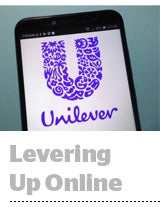 Unilever’s sales and marketing channels are shifting rapidly during the pandemic, and these changes will be a permanent part of the business, executives told investors on the company’s earnings report on Thursday.
Unilever’s sales and marketing channels are shifting rapidly during the pandemic, and these changes will be a permanent part of the business, executives told investors on the company’s earnings report on Thursday.
“Online shopping, especially online grocery shopping, will not revert to pre-COVID levels once social restrictions are no longer in place,” said CEO Alan Jope.
In the past three months, the company has reshaped its marketing approach. Unilever stopped out-of-home advertising altogether. And it’s “eased back” into print, TV and other channels depending on the country or state’s lockdown status, he said.
“But by contrast, our brands are communicating digitally,” he said. One priority online has been to get people to consume grocery supplies – essentially to clear out pantry items after many US households stocked up. Jope cited barbecue and staycation cooking ideas as areas the company has promoted, along with the Unilever-owned Recipedia site, which integrates with Amazon Alexa devices and grocery delivery.
“We have changed almost all of our advertising messages, both the content and the media choices,” he said.
And though Unilever’s ad budgets are smaller, the company has “kept some powder dry” to ramp up in the second half of the year, said CFO Graeme Pitkethly. Overall spend is down partly because media rates have dropped by 20% to 25% across the board, and as much as 40% in places.
The company also overhauled its innovation bets, Jope said.Unilever already cut 20% of its innovation brands, which are smaller, local or often niche startup brands, he said. More trimming could come in Q3.
The company dramatically increased some innovation investments, including a small hand sanitizer business with two manufacturing sites, Jope said. Unilever now has 60 sites producing sanitizer, and the business is already larger than the market leader’s 2019 output.
The manufacturing itself is also changing on the fly, he said. Different pack sizes and brands sell online, which is where Unilever is diverting resources and production.
“We are ensuring that our innovation and marketing activity are well designed for ecommerce,” he said.
Despite the quick changes and acceleration in ecommerce, Unilever’s sales declined 0.1% from the same period last year. The stock price jumped more than 7% after the earnings report, because even flat sales are better than expected for CPG giants this quarter.
There are encouraging signs that the acceleration isn’t done. Ecommerce sales grew 49% year over year in the first half of 2020, but were up 62% in Q2.
But Unilever, which didn’t issue new revenue guidance due to uncertainties in commodity prices and the coronavirus, will increase investments conservatively, according to Pitkethly.
“We will perhaps all need to be prepared for a sort of two steps forward, one step back dynamic in the months ahead,” he said.














